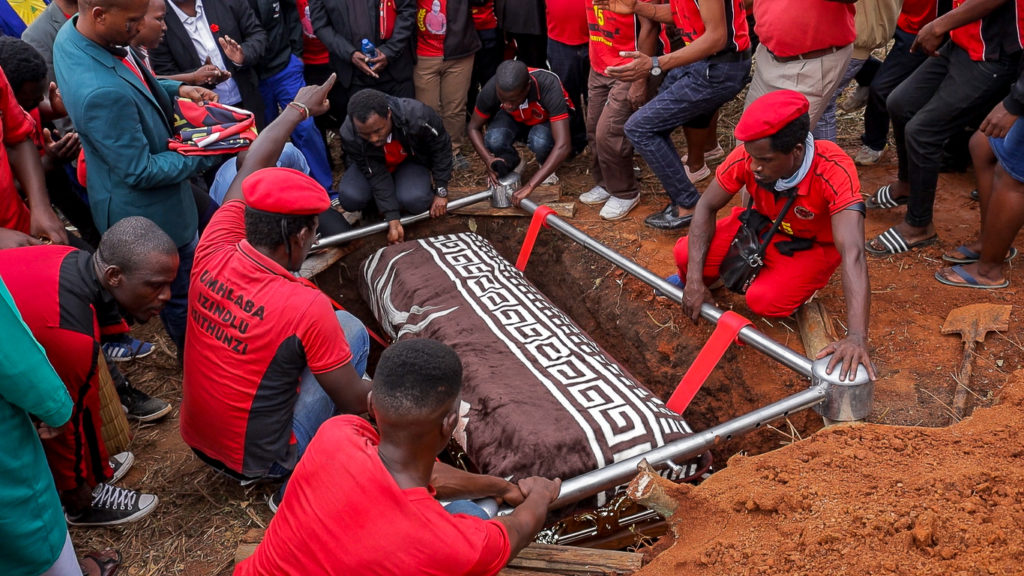Photo: Lindokuhle Mnguni, chairperson of eKhenana commune of Abahlali baseMjondolo. Credit: Siya Mbhele
Reposted from People’s Dispatch
28-year-old Lindokuhle Mnguni, the twice imprisoned chairperson of the eKhenana commune of South African shack dwellers’ movement, Abahlali baseMjondolo (AbM), was gunned down at his home in Cato Crest, Durban, at around 1:30 a.m on Saturday, August 20.
“Two gunmen smashed his shack’s window with a spade, kicked down the door and opened fire into his home. His partner, who was with him at the time, was also shot. She remains hospitalized after undergoing a surgery. She is fighting for her life,” Thapelo Mohapi, AbM general secretary told Peoples Dispatch.
Mnguni was out of prison on bail at the time of his assassination, two days before he was to appear in court to defend himself from murder charge on Monday, August 22. According to eyewitnesses, his two assassins were part of the hit-squad that on March 8 had killed his co-defendant, AbM eKhenana branch’s deputy chairperson Ayanda Ngila, who was also on bail after having been charged for the same murder.
“There were four defendants in this case. After they killed Ngila, there were only three, and now there are only two alive after Mnguni’s murder,” Mohapi said. They are the branch’s secretary Maphiwe Gasela, a mother in her mid-20s, and 34-year old Lando Tshazi, chairperson of its youth league.
Ngila, Mnguni and Tshazi had first been arrested in March 2021 and charged with a murder. Subsequently, in May that year, Gasela, along with another branch member Siniko Miya and AbM’s national vice-president George Bonono, were arrested and charged of conspiring to murder witnesses against Ngila, Mnguni and Tshazi.
All charges were dropped after it was proven in court that the witnesses of the police had provided false testimonies. Only months after their release in the end of September 2021, Ngila, Mnguni and Tszhazi, along with Gasela, were arrested again in January 2022 and charged with another murder. They were released on bail by the end of February after the police were once again unable to show any evidence to make their case.
They were given heroes’ welcome at the AbM’s general assembly in the eKhenana commune on March 6. Members at the gathering danced, hummed and cheered in chorus as Lindokule Mnguni sang a song of resistance he had composed in prison.
Then came the hitmen
After the assembly had concluded, Ntokozo Ngubane, one of police’s false witnesses in the previous murder charge, and her brother Khaya Ngbane, led goons into an attack on the commune members. Siniko Miya, who had been imprisoned in the fabricated case last year, was attacked with an ax. Two days later, Khaya Ngubane, along with three other gunmen he led, assassinated Ngila, according to eyewitnesses.
After Khaya’s arrest, his father Samson Ngubane, who is allegedly a local leader of the ruling ANC interested in dragging the commune land into the real estate market, had threatened AbM members in the premises of Durban court that “there will be bloodshed in eKhenana”.
This was stated by Nokuthula Mabaso – a mother of four who was a key witness to Ngila’s murder – in the affidavit she had prepared to oppose Khaya Ngubane’s bail on May 6. An evening before, Mabaso was also gunned down. Samson Ngubane and his brother were arrested for her murder on July 26.
Following her murder, Mohapi said, it had become evident that there was danger to the lives of Mnguni, Tshazi and Gasela. The police had roped them, along with Ngila, into a second murder case they are unable to substantiate, seven months after making arrests this January.
“So we had moved them from the commune to a safehouse,” he said. “But on Saturday, they had come to the commune to work on its poultry farm and vegetable garden” – among the key projects which make eKhenana AbM’s landmark accomplishment.
Since its inception in 2005, AbM has been occupying lands and building shacks with the collective labor of its own members to house the urban poor. These shacks are also self-connected to water and electricity supply, without help or permission from the government.
eKhenana is one such occupation with 3,000 shacks. Since it was established in Cato Crest in 2018, its residents have come under attack several times by goons as well as by police and armed private security personnel who accompanied the several illegal demolition drives by the ANC-ruled local municipality.
Resisting these attacks which were only increasing during the COVID-induced lockdown despite a moratorium on evictions, the members of eKhenana not only managed to keep the land they had occupied but also started a vegetable garden, poultry farm and a tuck shop to sell fast food. These profitably-run communal projects provided a key source of nutrition and generated incomes that were used to address the needs of the community members.
By thus demonstrating to the urban poor that it is possible to organize to live with dignity, without having to depend on the ruling party’s patronage, the militant shack-dwellers’ movement has invoked the wrath of the ANC, AbM argues. Ayanda Ngila fell to bullets in the vegetable garden while working on fixing the irrigation pipes in March. The eyewitness of his murder, Mabaso, who had since taken charge of leading these projects, was also killed in May.

Work on these communal enterprises had since come to a halt. Residents have been living in fear as gunmen have allegedly been frequenting the commune and opening fire in the air at night. Under these circumstances, residents had resolved at a meeting in July to close down the tuck shop as it was an easy target for gunmen. It was, however, resolved in the same meeting that the vegetable garden and poultry farm had to be revived.
To contribute their labor to this work, Mnguni, Tshazi and Gasela had come out of their safehouse to the commune on Saturday. “They fenced the poultry, plowed the garden and planted spinach and cabbage. Gasela then left in the afternoon, but Mnguni and Tshazi decided to stay back for a meeting in the evening to discuss the way forward for these projects. It went on till eleven at night,” Mohapi said.
“When the two gunmen broke into the occupation after midnight, they first went to the community hall. On finding no one there, they broke into the shacks of Tshazi and Miya. But they had slept in other shacks, and were saved,” he said. “But Lindokuhle had made the mistake of going back to his own shack to sleep. They found him and killed him.”
‘Socialism or Death!’
His murder came as no surprise. Describing him as “a fearless leader” who always “stood for his community”, AbM said in its statement, “Mnguni knew that he had chosen to live and struggle in the shadow of death. He made it very clear, in his calm and gentle way, that he had chosen socialism or death.”
For Mnguni, no talk of socialism was real without the struggle for the collective ownership of land. “Our forefathers, our grandparents were promised that if they struggle and defeat apathied regime…they will reach socialism…[that] everyone will have access to land, because [the ANC] knew the impoverished wanted to have access to land. But what happened after 1994?” he asked while addressing a forum at The Forge in June. “If we say we want to bring socialism, [and] yet land is not on top of the table, we will forever languish in poverty,” he warned.
“In our country we have many people who call themselves socialists, communists. When you say, please show me what you have done…they will give you only ideas…But this is not rocket science. When you say you are a socialist the problem that you want to solve is the problem of poverty…But you can’t solve it just by relying on ideas. We need action [for collective ownership of land],” he insisted. “When poor people commit themselves to politics, they don’t commit themselves to mere ideas… we join politics because we have problems we want to solve.”
A voracious reader of Marx, Fanon, Freire, Biko and Malcom X from a young age, Mnguni was never the one to shy away from sharp-witted retorts to the elite intellectuals, teaching socialism down to the poor. Mohapi recollected Mnguni’s unshakable confidence that “the working class, the poor have brains, and can study, teach each other and produce their own intellectuals.”
It was with this vision of Mnguni that the Frantz Fanon political school was set up at eKhenana in late 2019, Mohapi said. Functioning since 2020, it provides training to run communal projects and also imparts political education. “The Communist Manifesto was studied line by line in the Frantz Fanon school,” AbM said in its statement.
“People who call themselves liberators should stop wasting their energy on educating us about how poor we are,” Mnguni added in his address. “We, as the working class, know we are poor. What we need is action.”
In the 17 years of this action by AbM on the frontlines of the South African poor majority’s struggle for land, Mnguni became the 24th leader it has lost to assassination. “We knew the price we had to pay,” he had said last month.
Remembering his conversations with Ayanda Ngila in prison, he had added, “We used to talk a lot about death because we knew that someday luck won’t be on our side. They will kill us. We even said, ‘it is socialism or death!’…because we can’t really continue living in these inhumane conditions.”






